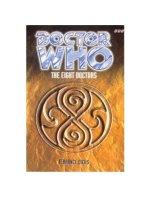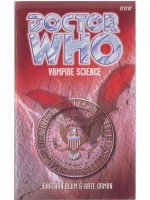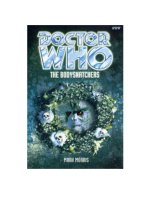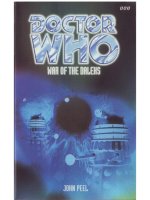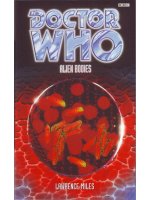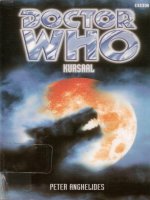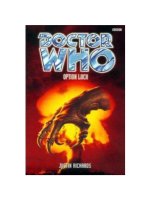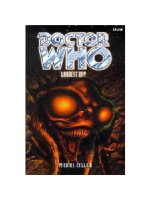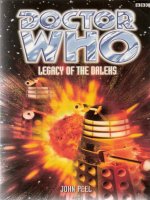Dr who BBC eighth doctor 17 beltempest jim mortimor
Bạn đang xem bản rút gọn của tài liệu. Xem và tải ngay bản đầy đủ của tài liệu tại đây (973.28 KB, 218 trang )
Beltempest
Jim Mortimore
for
Steve
'Because I draw on the temporal psychic energy of all spankings through
the ages '
Cole
- definitely one of the good guys
Prologue
Even stars die.
They may grow old, they may seem inconceivable when held against the
flickering candle of our own existence, yet they too have lives that are
shaped by the same universe, the same immutable laws as are our own
lives.
In the measure of Deep Time the brief moment of existence of all the
stars in the universe is as the moment a butterfly lives compared with all
the summers that will ever be. for the red giant, galactic summer is over
and winter is approaching. Its hydrogen fuel long since exhausted, this
old, mad sun has consumed its inner worlds and barely noticed their
absence. Burning helium now as a lingering precursor to death, the red
giant prepares to shrug off its outer mantle of remaining hydrogen and
take its remaining family of planets with it into oblivion.
Within the star, a schism: its core shrinking and growing ever hotter even
as its outer layers expand and cool. Soon now will come the moment of
death, of explosion - the surviving solar matter burning in a tiny
incandescent lump at the heart of a nebula composed of the tattered
shreds of its own corpse.
Still from death comes life. A truth unchanging while there is yet energy
in the universe.
While the red giant continues slowly to die, life on its many worlds
continues to grow and evolve.
It was an old world, one from which the fire had gone. A dark backwater,
an eddy in the current of life, with no bright future or destiny, forgotten by
any who might once have observed it or experienced it for however brief
a moment.
Its chill plains and freezing mountains, its sparse black vegetation and
cold-sculpted animal life were left to just one pair of eyes to study: a
single mind to look up at the sky and wonder if it would kill those who
lived beneath it today, or play with them a while longer before dismissing
them from this life.
Skywatcher glanced at the iron-grey clouds that scraped the tops of the
White Mountains and tried to work out how long it would be before the
snow on the ground covered the tracks of the fast-moving herd of
hornrunners. Skywatcher and his brother, Fastblade, had been tracking
the herd for three days. It was his responsibility to make sure the sky
would allow this kill. If Fastblade did not find the hornrunners' winter nest
before the snow concealed it from view, then many would die from
starvation in the coming months, and the hornrunners would emerge
from their hibernation to a world cleansed by cold of all but the most
isolated - probably cannibalistic - pockets of human life.
Skywatcher pulled his furs more tightly around his chapped face, his
nose clogged with the greasy stink of animal fat smeared upon his skin
to protect it from the biting cold. Fastblade had no such protection.
Fastblade needed every sense clear and unclouded. Whereas this
weather was, for Skywatcher, the fear and wonder of a cruel friend, the
same weather for Fastblade was little more than a tool with which he
focused his mind acutely on the task at hand. The tracking of the nest.
Two very different men, then, Skywatcher and Fastblade. Yet, though
the sky affected them in different ways, it made them brothers, too. For
without the sky to determine their actions they would surely be little more
than mindless animals living easily from an endless bounty of summer
food. Skywatcher had heard many of the village curse the sky, the space
above, the endless night drawing close about their world. He had heard
the prayers to a dying sun, swollen with cold crimson light, whose
nearness brought little comfort beyond the beauty of dawn and sunset
across the frost-laden plains. But, unlike his fellow men, Skywatcher was
not afraid. Not of the sky. How could he be? The sky was his friend and
loved him. The sky brought him life in the form of birds too cold to fly, of
snow to make water, of berries and meat preserved in the frost from one
season to the next. Skywatcher knew where life came from on this
world. And he loved the sky in turn for making every day a challenge, for
making every hour and every moment linked and full of meaning, like the
crystal spokes of a single snowflake.
Fastblade thought it was all birdlime, of course.
Fastblade hated the cold. Hated having to hunt. He took no pleasure in
experience. He seemed little able to observe and think, and make
connections, and totally unable to wonder about anything beyond where
the next meal would come from to fill his belly. It had been many
seasons since the moment when Skywatcher first realised that the
number of people who thought like Fastblade was increasing with every
generation, whereas the number of people like himself was growing
smaller. It was a moment that had shaped his life. But it was also one of
which he had told nobody - for who would understand his view, or care?
In that moment of realisation, Skywatcher knew his people were dying.
Not as individuals but as a species, unable to adapt to the conditions
prevalent on their world, conditions that grew harsher every desiccated
season. Sometimes he wondered what would follow after they had all
died - whether there would simply be nothing at all, or whether some
other form of life would take their place to hunt the hornrunners beneath
an ever more swollen sun.
It was a question to which Skywatcher knew he would never have an
answer. But that did not matter. For the question itself was simply one
more experience, one more crystal spoke on the snowflake that was his
world and his life.
Hunting food was, too - as Skywatcher was reminded when a young
hornrunner erupted from an early nest a man's length from him and,
defending that nest, charged him with all seven horns articulated into the
position of attack.
***
Fastblade saw the movement of snow a heartbeat too late. Veiling a
warning to Skywatcher, he launched himself across the snow, dagger
drawn, teeth exposed in a furious scream.
Skywatcher was frozen in place before the animal bursting from the
snow in front of him. Fool. Dreamer. If he died the tribe died with him.
Did he not know this? Did he not care?
Wasting no time on recriminations, Fastblade lurched across packed
snow, his furs a cumbersome demand on his reserves of energy, even
while protecting him from the killing cold. Above, the iron-grey clouds
were moving ever closer, bringing a murky crimson darkness with the
promise of more snow. Closer, the hornrunner had now emerged from
its burrow and was skimming the ground on six triple-jointed legs, the
pads that served for feet slapping almost silently against the snow and
sending swirls of white powder into the heavy air.
Quick as Fastblade was, his eyes were quicker. Even as he ran they
were searching the tableau for an advantage. There was none.
The hornrunner reached Skywatcher, who now tried to hurl himself clear
of the enraged animal. All seven horns had locked forward into the
attack position. The hornrunner was a young
animal, massing barely twice as much as Skywatcher - but still it would
be enough to kill him should even one of those horns bite home into his
body.
Skywatcher dived - and the hornmnner caught him with three horns
while still in midair.
A moment later Fastblade leapt clumsily on to the animal's back and
drove his dagger into the furred gap between the bony plates at the base
of the animal's skull. The hornrunner reared and Fastblade found himself
flying through the air. The ground punched the breath from his body. He
looked up to find himself eye to compound eye with the hornrunner. It
was dead of course. He knew that from the lustre of the many lenses in
the eye, the coating of frost already forming there as the animal's body
heat was leached away by the wind and the storm of snow its own death
had thrown into the air.
Fastblade retrieved his dagger, cleaned it, then staggered to where
Skywatcher lay moaning on the ground.
One of the runner's horns had snapped cleanly off and emerged from
the bloodstained furs cladding Skywatcher's thigh. More blood leaked
from wounds in his shoulder and arm. But the worst wound was in his
chest. Blood pumped sluggishly, staining the furs there, showing no sign
of abating.
Skywatcher blinked, his face pale even beneath the layer of animal fat.
More blood flecked his lips. He tried to speak. No words came, just an
animal-like moan of pain. His eyes closed and opened spasmodically.
Fastblade ripped open Skywatcher's furs and began to pack handfuls of
freezing snow against the chest wound. Skywatcher groaned. Fastblade
wasted no time on words. If Skywatcher died the tribe died with him. If
he lived - well, there would be time enough for blame then. Otherwise Fastblade packed the snow as tight as he could against Skywatcher's
chest. But even as he did this he knew the effort was useless. For every
handful of fresh white snow he brought, the balance was stained pink by
the release of Skywatcher's lifeblood. A weak movement beside him
stopped Fastblade's activities. Skywatcher's hand grasped feebly at the
furs at his wrist. Fastblade batted the hand aside and continued with his
work.
Then he looked into Skywatcher's eyes. They were gazing mutely at the
sky from which he took his name.
Blood bubbled at chapped lips. Skywatcher was trying to speak.
Fastblade leaned closer but Skywatcher's voice had no strength. Instead
his finger managed to point upward.
Following his indication, Fastblade looked up. His mouth dropped open
in mute astonishment.
Through a jagged break in the iron-grey clouds Fastblade could see the
sky. And the sun, a swollen crimson globe partially obscured by three
circles of darkness - a triple eclipse, impossible on a world that knew
only one moon.
Cradling his brother in his arms, Fastblade gazed in stupefaction at the
impossible sight and cried aloud. If he felt Skywatcher's life depart he did
not know it.
The three dark circles conjoined, obscuring the swollen girth of the sun
and plunging the world into unexpected darkness.
Fastblade had seen an eclipse before. He sank to the ground beside his
dead brother, his eyes aching from the sudden lack of red light, and
waited for the light to return.
When it finally reappeared the sun was dark, a seething black shell with
occasional bursts of light from within.
Fastblade prayed for his brother as the night grew colder and darker. He
waited for morning to bury Skywatcher, but morning did not come for
more than a year.
***
Skywatcher planted the bone spade and tipped a last stack of snow
across the grave. Fastblade had been the last hunter to die. Like the
others he had died night-blind, raving in his sleep from fever and the
visions. Now he joined them in endless sleep, their bodies preserved for
ever by cold in a world that had known but a flicker of light for more than
a year.
Skywatcher remembered the stories Fastblade had told him of his,
Skywatcher's, father and how he had died because he was careless.
Now Fastblade himself was dead. He, Skywatcher, was the eldest now even though in Fastblade's eyes he had been little more than a child.
A child who had seen a sun die and a world end. Who had seen crops
fail and people kill each other in their mad desire for food. A child, now a
man, who waited only for death.
The last spadeful of snow hit the grave and Skywatcher patted it down.
Then he looked up at the cloudless sky and at the stars - and the circular
patch of darkness shot through with occasional threads of fire which
marked the position of the dead sun. He wondered if his father would
have known what this meant. The sky had changed with his father's
death - as though the two events were linked. But were they, really? And
did it matter? Skywatcher barely had the strength to lift the spade. There
had been no food for half a season and most the tribe was dead.
Skywatcher put down the bone spade. He sat beside the grave. What
should he do now? His mind, having been occupied by the work of
digging, now returned to its long fear: that with no food there remained
no choice but to wait for death.
Skywatcher felt madness take him then. He jumped up and began to
dance, a clumsy lurching movement in the agonising cold. He began to
sing, too - nonsense words, children's words.. He felt like a child, felt on
the verge of something he could not name, felt his heart sing in his
chest, beating a rhythm to which his life kept time. A tiny part of his mind
wondered what would happen when his heart lost the beat - whether he
would notice the end of the song. Whether he would notice his own
death. Then the song took him again and he lost himself in the madness.
So it was that he missed the miracle: others witnessed it and later told
him of it, but Skywatcher, in his madness, missed the moment for which
he had taken his name. The moment in which light and life returned to
his world, with a new, impossible sun.
The old red giant is gone, in its place a younger, warmer star.
A momentary flush of life on the innermost planet is replaced by another
threat of extinction, this time not from cold but from heat.
Centuries pass. Aeons. Throughout the solar system other changes are
taking place. Old life, dying among the outer planets, is given another
lease by the heat and light of this newer, more temperate star. New life
on the innermost world is placed under threat. The evolutionary
imperative for survival throughout the changing solar system is renewed.
While the yellow main-sequence star itself progresses slowly through a
second impossible infancy, life on its many worlds continues to grow and
evolve.
It is a process observed fleetingly by three planet-sized masses as their
orbits carry them beyond a solar system now flourishing with the new life
they have inadvertently made possible.
Part One
Chapter One
There is only one truth and that truth is endless and that truth is death.
Eldred Saketh rehearsed his final speech in his head, bringing the
'corder close by to ensure it caught every passionately enunciated word
and pious expression as he stepped out on to the lava field to die.
His face was calm despite the torturous heat rising from the molten rock
amid clouds of toxic steam. His farewells and preparations were said, his
life was now surrendered gladly so that he might enter his Endless
State.
Saketh knew he had only moments to live. He had no regrets. If his life
had taught him anything it was that life itself was simply a muddled and
inaccurate definition of that which was not Endless - a state of emotional
frenzy with no clear focus or objectives, a state that did little more than
dilute the truth and purity of the Endless State of Unbeing which was
death.
Truth and purity were best for people. The thousands who had preceded
him on to the surface of Belannia II had understood that. Yet still there
were millions - billions - who did not understand. Their lives were small,
insignificant points of no dimension, circumscribed by their hollow loves
and self-serving desires. They did not understand the truth. Life was
fear. Life was confusion. Life was helplessness. Life was pain.
The Endless was the removal of such pain. Those who were Endless
now understood that. So too would the billions to come once they had
experienced at second hand the glorious inception of his Endless State.
Of course you couldn't put it quite like that. You had to tell the truth in
terms they could understand. You had to quote scriptures and mention
rewards and eternal life after death. It was a process Eldred had found
over the years to be both rewarding and frustrating in equal measures: a
perfect balance - and a perfect illustration of the unnecessary and
impure complexity of anything not Endless.
Now, in recognising his frustration and anger at the need to obscure the
truth with pretty lies in order to give people the greatest gift of all for free,
Eldred also recognised his own weakness, his own fallacy, his own state
of impure complexity. It was time to purify himself and therefore his
message.
The Message.
Eldred carefully rehearsed his final words again. They were the most
important words he would ever speak. The future of his belief depended
upon them. The speech was beautiful in its simplicity. It could not
possibly fail to be understood by anyone who beard it.
Seeing no reason to wait any longer, Eldred began to speak. He spoke
the words slowly, with gravity befitting their importance, rejoicing in the
near-intolerable pain the toxic air brought to his throat and lungs in
exchange for their utterance.
Then, screaming in what he told himself was exultation, Eldred Saketh
fell convulsing upon the very edge of the lava field and waited
impatiently to die.
And waited. And burned. And screamed. And waited. But he did not die.
Instead he found a new Message. This new Message even had a Sign.
Above Eldred Saketh's frenziedly thrashing body, above the lava fields
and the toxic air of Belannia n, the ferocious yellow ball of incandescent
hydrogen, which for thousands of aeons had provided life and stability in
a system already old beyond its time, began once more to change.
***
Eyes closed, elegant fingers loosely clasping copies of both Hospital
Station by James White and Green Eggs and Ham by Dr Seuss, which
he had been reading simultaneously, the Doctor stretched out one leg
from his sand-locked, palm-shaded deck chair and nudged the replay
button he'd recently wired into the Ship's gramophone with the toe of his
left shoe.
The stretch was a bit of an effort, but not as much of an effort as moving
the chair closer to the music system - also sand-locked a little further up
the beach from the sun-brightened waves -would have been.
At his touch, the button - a bright, red, palm-sized emergency shutdown
control removed from the drive generator of a junked sandminer - sank
home with a satisfying clunk and, after the appropriate attendant
clashing of gears and slippage of gramophone needles across sandy
wax, the music system obligingly began to warble a repeat of Louis
Armstrong's 'We Have All The Time In The World'. The Doctor sighed
happily.
Exactly 6,000,000,215 nanoseconds and one line of poignantly
enunciated lyric later, a woman's voice said quietly from the sand beside
him, 'Wouldn't it be easier just to put ten copies of the record on to the
spindle?'
The Doctor stretched luxuriously. 'You know what I like most about you,
Sam?' he said, then immediately answered his own rhetorical question:
"The way you ask such challenging questions.' Samantha Jones
frowned. In the same quite, adult tone of voice, she said, 'Thank you,
Doctor. And I really like the way you still, think of me as a child.'
The Doctor leapt to his feet. The motion was effortless, the speed
dizzying. He bounced lightly on his toes for a moment, relishing the feel
of gravity fighting with his own inertia. 'My dear Sam, the aquatic
Crocodilians of Aquaatus VI are subjected to such terrible physical
trauma from their environment that their intelligent, telepathic embryos
are born so brain-damaged their only useful function is as a protective
host for another intelligent, telepathic embryo.'
'That,' Sam said, 'is utterly distasteful.'
"The point being: childhood is relative.' The Doctor considered, then
added rapidly, 'Except, of course, when the child in question is also a
relative, in which case the relativity becomes relative and, er, well, you
do see where we're going with this, don't you?'
Sam affected nonchalance. 'No. But wherever it is we're making good
time.'
The Doctor casually studied the relative levels of quartz and fossilised
animal matter present in fifty-three of the closest grains of sand.
'Relatively speaking, Sam, nothing is going nowhere. And, given the
current energy state of the universe, nothing is definitely going nowhere
with a relative speed greater than the most excited subatomic particle.'
The Doctor stopped bouncing and instead began to pace. He did this
with the same manic intensity with which he did everything, including
thinking. The fifty-three grains of sand - along with several thousand
others -were displaced by his feet as easily as they were displaced by
his mind.
Sam sighed. 'Manifestly,' she said with all the patience she could muster.
The Doctor stopped pacing suddenly. 'I don't suppose you're old enough
to have offspring yet, are you?' 'Children, you mean?' Sam blew out her
cheeks and huffed mightily. 'Now there's a conversational leap of
biblical proportions.'
The Doctor waited.
Sam said, 'I love you when you're in a rhetorical mood. Kids. Well.Yeah.
Sure I want them. Doesn't everyone? Don't you?'
The Doctor opened his mouth to respond but Sam was already
continuing, 'Don't worry. The question's rhetorical. The idea of all that
pain bringing forth new life is horrible but - you know - kind of interesting.
I mean, why does it have to hurt like that? I mean -it's hardly proevolution, is it? If women were sensible they'd all have babies in test
tubes and nobody would need to be hurt again, right?'
The Doctor frowned. 'Tell that to the test tube.'
Sam giggled. 'You what?'
'Just my morbid little joke. Forget it.'
Sam frowned. 'Whatever. Anyway... what about you? Do you have a
family?'
'We talked about this before, Sam. Don't you remember?'
"That was then. I've got a new perspective now.'
The Doctor smiled. 'I like to think of the universe itself as my foster
family. It took me in when I was young. Taught me about life when my
own parents decided to opt out of their responsibilities. It was kind to me
when I needed it and so I look after it from time to time - keep it hanging
together, you might say, through its old age..."
Sam laughed. "That's a metaphor, right?'
'Is it?' The Doctor did not smile.'You never met my parents, did you?'
Sam shivered suddenly. Time to change the subject. 'Do you know
everything ?'
Now the Doctor did smile, and his face lit up with mischievous delight.
'My dear Sam, we live in an age of information supersaturation. Even I
cannot know everything. An incarnation of mine once said, "Sometimes
you've got to be dim to be brilliant".'
'That,' said Sam, 'is an oxymoron.'
'But of course,' chirped the Doctor merrily. 'What's the point of being an
oxygen breather if you can't be a moron?' Sam's frown deepened
disapprovingly. 'And that's a pun.' 'Is it? Oh dear.' The Doctor's face
assumed an expression of such gravity he felt it might collapse under its
own weight. 'Perhaps we should continue this conversation over
breakfast.'
Sam allowed herself the faintest smile. 'Green eggs and ham?' She
nodded at the Doctor's first choice of leisure-time reading. 'Not very
vegetarian. I think I'll pass.'
The Doctor glanced at the book as well; the smile remained but went a
little odd around the corners.
Sam added, 'But I might just have some toast. If we can have it here on
the beach.'
The Doctor frowned, glanced quickly around himself, then blinked apparently in amazement. 'Yes, yes, of course, you're quite right, quite
right! A beach! Obvious, really. You know,' he added to Sam in tones of
childlike delight, 'I never thought of it like that before. As silicon, yes,
mica, quartz in powder form, various geological formations concealing
numerous species of biological life assaulted continuously by liquid in a
high-energy state.'
He sat cross-legged at the edge of the surf and crumbled a handful of
sand between his fingers. 'But never as a beach: He glanced pointedly
at Sam and rushed on excitedly: 'Sometimes you can get so caught up
in the brushstrokes you fail to see the whole picture.'
Sam thought for a moment about the time she had spent away from the
TARDIS, the things she'd learnt about herself - the things she thought
she'd learned. 'Are you trying to tell me something?'
The Doctor grinned with all the crooked charm of a child thief. 'Only that I
like my eggs sunny side up and my ham green.'
Sam felt a smile sneak across her lips. 'You're impossible,' she said with
a smile.
The Doctor smiled back. 'Manifestly,' he said.
And that was when the beach exploded.
***
'What's going on!' Sam spat the words out with a mouthful of sand as
she felt herself lifted and slammed against the heaving beach. A short
distance away the previously tranquil waves were spiralling up into an
ice-green mountain of water. It looked very, very hard. She screwed her
eyes shut, then immediately opened them. She was not going to die
with her eyes shut, that was for sure.
Some distance away the Doctor was standing with both feet planted
squarely on the heaving beach, trying to rescue his records from the
gramophone. His voice came as a distant sigh upon the howl of
displaced air. 'Something I hadn't anticipated. Some kind of gravitational
disturbance.' Seventy-eights sprayed into the air as the Doctor was
rocked by another heavy disturbance. Waves lapped around his feet.
Sparks erupted from the gramophone. 'Yes, yes, I know, the old thing
seems to be having a bit of a problem with it. Unusual to say the least,
yes, very unusual - not to mention a tad worrying.'
'You can forget the excuses!' Sam howled above the noise of splitting
rock. 'If you didn't want breakfast all you had to do was say!' She ducked
as a palm tree sailed overhead to smash against the airborne shoreline.
A rain of coconuts followed. 'Now will you please just sort it out before
we're both killed!'
'Going to try ejecting bits of the architecture to stabilise the -' The rest of
the Doctor's reply was lost to Sam. Sand that had been whipped into
airborne dunes by the wind dumped itself in choking tons over her and
everything went dark.
It wasn't dark for very long. Just long enough for her to get very scared
and short of breath. Then the shaking began again, together with a
terrible screaming sound - a noise like planets being torn apart by the
errant child of some hideous god.
The sound increased, and the shaking, and so did the pain in her chest
as she tried really hard to hold out for air to breathe instead of sand.
She felt a pressure behind her eyes matching the pressure of sand on
them, opened her mouth to scream, swallowed sand, then found herself
falling, rolling, gasping for air and choking up the sand she had
swallowed.
She opened her eyes. She was in a park. The ground was shaking. The
sky was a glass dome through which the beautiful green-grey bulk of an
ocean world loomed. Lights from cities blotched the surface of the
planet. The lights were moving, floating. Stars shone, hard points,
beyond the planet. There was wind. Lots of it. The small sand dune she
was floundering in was whipped away from her in abrasive streamers
that scraped at her arms and face.
A palm tree, presumably uprooted from the TARDIS beach, fell dose by
and Sam rolled away quickly.
The scream of rending metal had become the scream of air emptying
through a crack in the sky. And the scream of people trying to leave the
enclosed park area.
People. Lots of people. Lots of panicking people.
Where was the TARDIS? How had she got off? Where was she now?
She struggled to her feet, aware the air was thinning, that the last
particles of sand were being dragged by the air currents along with every
leaf, every bit of dirt and a number of small, screeching animals, towards
the widening crack in the sky.
She ran across the shaking ground, swept up in the crowd, dragged by it
as first bushes and then small, ornamental trees swept up towards the
looming planet.
She felt hands curled into desperate fists pummelling her; she fell, curled
away from uncaring feet; she saw a wall of green-painted metal loom
before her, wide hatches gliding shut, halting as the ground twisted
violently, then buckling, to jam half open as people poured through them,
as a familiar sound called her to turn, to see the TARDIS appear in the
middle distance in a flood of sand and water, to tip, to fall into the chasm
opening across the section of woodland, to vanish from sight as she was
dragged screaming from the park.
She wasn't the only one screaming. Everyone - everything , -else was
screaming, too. The people fleeing the garden, the atmosphere forcing
itself through the jammed airlock; even the ground was screaming as the
foundations buckled and the sky tore and the city began to empty itself
into vacuum.
She felt herself being pulled backwards by the slipstream and pushed in
as many different directions as there were people around her.
Occasionally a voice rose above the gestalt scream of the dying city.
'- spaceport, get to the -'
'- here, Jenny, come here! Stay with me or you'll -'
'- it's coming down, the roofs -'
'- are you? Jenny, where -'
Sam felt herself carried along helplessly in this tidal wave of people,
swept along in an endless moment of fear and panic. She felt hands
grabbing at her, pushing, tugging at her clothes and hair; she felt nails
rake across her cheek as the scream of the city tore at her ears, got into
her head, sandblasted her mind with what seemed to be every fearful
moment she'd ever experienced.
Then it stopped. Or, rather, no. It didn't stop, she stopped. She stopped
being scared .
The screaming continued, but it was just sound now, just the sound of
other people's fear. With this knowledge to arm herself against the
surprise at her sudden lack of fear, Sam found she was able to stand
fast against the crowd, moving sideways, dodging fists, ignoring blows
she could not avoid, until she reached the side of the corridor, where she
pressed herself against a wide pane of glass with the words
BLACK ROCK MINING
EQUIPMENT - SUPPLIES - CLAIMS REGISTERED QUALITY WORK LIFETIME GUARANTEE
written on it.
Sam watched the crowd rush past, felt the air thin around her, then
turned away to face the glass. She had to think. The Doctor was gone.
The TARDIS was gone. Five minutes from now the air would also be
gone. Shortly after that her life would be gone. The glass of the shop
front seemed to ripple like water with the reflections of the people
streaming past. Her own reflection seemed to gaze right back out of the
shop at her, eyes wide, cheek furrowed by parallel scratches and
streaked with her own blood. Think , she told herself. You're an adult.
Adults don't panic, they don't scream, they don't run. They don't trample
each other, they don't lose their kids, they don't suffocate or get crushed,
or - die. They don't die they don't They were going to die.
She was going to die.
Sam leaned her face against the glass, tried not to imagine what her
body would look like emptied of life, bloated and burst from
decompression; tried not to imagine how much it would hurt, how much
it was already hurting.
She pressed her face harder against the glass, hoping the pain from her
cheek would let her focus on the problem, and find a solution to it.
Nothing. Just the glass. The reflections. The shop, with shelves of
equipment racked ready for sale or use.
She grinned. The movement caught her cheek by surprise; it took a
moment for the muscles to catch up with her thoughts, and then when
they did, the pain was very, very bad.
But the smile persisted.
She knew what she had to do.
She picked up a chunk of fallen synthocrete, hefted it and hurled it as
hard as she could against the glass, which cracked, ever so slightly. A
few more blows had the window lying in smashed ruins, the debris
already peeling away in a jagged rain. Sam stepped over the sill and
began to rummage among the equipment. They had to be here. They
just had to. What self-respecting purveyor of quality mining supplies did
not carry - oxygen supplies !
And here they were.
Gratefully cracking open a cylinder and breathing from the mask, Sam
wondered what to do next. The stream of people outside had slowed but
not stopped.
In fact some of them had paused in tiieir flight long enough to look in
through the smashed window. Some of them had even thought, as Sam
had done, what might be found there. Now several were clambering over
the sill into the shop.
'it's OK,' Sam mumbled through her mask. 'There's plenty of air. Look.
It's over here. Just grab a cylinder and -'
The people ignored her.
The people grabbed the cylinders of air.
The people ripped the mask from her face.
The people then attacked each other in order to keep the most air for
themselves.
All the while the pressure fell.
Sam gasped, knocked sideways by an uncaring fist, sprawled among
the knocked-over shelves of equipment.
She tried to find the strength to crawl away from the mob before being
trampled in the search for more supplies. There was no strength left. All
her energy was used up simply sucking air from the depleted
atmosphere.
Her head spun.
Lights flickered before her eyes.
Where was the Doctor?
A figure moved over her. She tried to cower but could not move.
A face swam closer, and Sam saw it was wearing an oxygen mask. The
Doctor? No. The apparent age was right but the hair was too short, and
the face too gaunt, the expression too... immediate. Too right here and
now. And the Doctor did not wear a cowl or habit.
'Help.' The word came out with a gasp, a tiny exhalation of the last
breath she had.
The priest glanced at her and his face twisted with real compassion. He
nodded. Sam shuddered with relief. Saved. She waited for air. Air did
not come. The priest did not remove his oxygen mask.
She tried to gasp out a plea for help. She had no breath to deliver it. Her
skin was prickling as the pressure continued to fall.
Help me! Please!
The priest offered a dazzling smile from behind the mask. "There is only
one truth.' His voice barely rose above the sound of escaping
atmosphere. 'And that truth is endless, and that truth is death.'
***
Surgeon Major Alesis Conaway swore as the steel door finally rolled up
into the ceiling of the corridor and the airflow suddenly increased. The
upper body of the man she had been treating for a broken arm was no
longer attached to its legs.
'Sealant, give me some sealant. And a cauteriser. And blood. Two litres,
Unidonor, and -'she stopped. The man - dressed in the cold blue of
Administration - was clearly beyond help. She swore again. His eyes
were still open. She wondered if she had been the last thing they'd seen.
She stood up. "The hydroponicum's that way, half a click.' She pointed
through the hatch. 'You, you, you, you and you - get it sorted. You and
you, clear the body. And I don't want to hear any arguments about who
gets the messy bit.'
You, you, you, you and you were halfway through the hatch when their
passage was collectively blocked by an average-sized man of medium
build and large presence, who was bouncing agitatedly from one foot the
other while simultaneously adjusting his cravat, brushing at a rather
crumpled frock coat and shaking sand from a thick mop of unruly hair.
'You,' he said, pointing at the nearest nurse. 'And you, and you, and you
and you, come with me right away. We have to help the old girl.We have
to get her out. We have to do it now, or -'
Conaway barged through the skirmish line of nurses. This was all she
needed: a panicking citizen making her job harder than it already was.
'Shut up. If you can walk, then walk that way to the spaceport, only don't
walk - run. Otherwise, I'll assume you're panicking and sedate you. Then
of course, I'd have the whole sorry business of informing your next of kin
when we didn't have time to get you aboard a ship.'
The man bounced up and down on his toes. He seemed agitated. Or
excited. Or frightened. Or possibly just mad. 'No.' He waved his hands 'wrung' might have been a better word. 'No no no no no, you don't
understand, you really don't understand. It's very simple, really. You see,
she's saved my life on more than one occasion, quite a lot more than
one occasion actually, and so I really don't feel justified in leaving her to
-'
Conaway sighed. She turned to a nurse. 'Jab him. ten cc's
benzoprophyliticine.' To the man she added, 'In case you hadn't noticed,
I've got some people to save.'
The nurse was a professional. He moved very fast, but as fast as he
was, the strange man was faster. In the time it took the nurse to
unholster his tranquilliser gun the man had removed his frock coat, rolled
up his left sleeve, crouched to remove a shoelace, stood up again, tied it
single-handedly around his arm just above his elbow, extended the arm
towards the nurse and was busy tapping his forearm to bring up a vein.
As Conaway watched, the man stared straight at her. He was absolutely
motionless now except for the fingers of his right hand tapping on his left
arm. Tap, tuh-tap, tuh-tap-tap, tap-tuh-tap. She became aware that the
fingers were beating out a rather impatient freeform jazz rhythm.
The nurse was used to treating people like this. He didn't wait for
instructions. He simply availed himself of the proffered arm and
administered a slightly larger dose of tranquilliser than Conaway had
ordered.
Nothing happened.
After a few seconds, nothing continued to happen.
Then the rather eccentric man undid the shoelace, rolled down his
sleeve, retrieved a cufflink from his shirt pocket, breathed on it, polished
it, fastened his sleeve with it, put his coat back on and twirled the
shoelace absently in front of his body like an old-fashioned biplane with
one damaged engine. 'In case you hadn't noticed, I've got a planet to
save.' The strange man turned and began to run down the corridor, in
the direction of the airflow, one shoe flapping distractedly as he did so.
'By the way,' he called back over his shoulder, while kicking free the
flapping shoe. 'I'm the Doctor. And you are...?'
'Surgeon Major Alesis Conaway.' The words seemed to come out
automatically.
'Excellent,' called the Doctor, somehow managing to inject a smile into
his voice from a distance of fifty metres. He turned to face her. 'Glad to
be working with you. Now, I know this is going to seem a little
peremptory, not to mention somewhat outside the chain of command,
but, under the circumstances, I would suggest that quick thought and
independent action are more than justified if we are to save lives.'
'Which is what I am trying to do.'
'Yes, quite, quite. I am sure that you are in your own small way, although
perhaps we could get into the business of self-congratulation at a more
appropriate time. You see, if I am correct, your presence here is merely
a stopgap, someone to alleviate the symptoms; very laudable, of course
- lives are always worth saving, no matter what the general population
trends and how you might be increasing the severity of any hypothetical
ultimate Malthusian control which might be lurking in the wings by using
technology to avert a more immediate natural disaster - but nonetheless
you really should be applying yourselves to the cause of the problem
and solving that, even if it happens to be at the cost of more immediate
lives, D'you see? Of course, that's the textbook theory. My own take is
somewhat more humanitarian. I say, save everyone now and worry
about the consequences later. D'you agree?'
Conaway wondered how much medication this man who called himself a
Doctor was already on. "This moon is undergoing tectonic stress,' she
told him. 'Nobody knows the reason. The entire city is collapsing. That's
twenty-three million people, in case you hadn't noticed.'
'I'm glad to see you've finally cut through to the nub of the problem. And,
if you can just help me reach the old girl, there's a rather wonderful thing
inside called a gravitic stabiliser which I can use to generate a zone of
tectonic stability around the immediate area, if not the entire moon,
assuming a planetary mass of roughly average proportions, of course,
and I see no reason why we shouldn't do that. I mean, how often have
you run across a solar body of anything less than average mass?
Exactly,' he added without waiting for an answer. 'Very conservative
thing, the average planetary body. Something to do with having such a
wonderfully large moment of inertia, I shouldn't wonder. Ah, here we are,
the hydroponicuni. The old girl's in that large fissure.'
Conaway glanced up at the shattered sky and the last shreds of
vaporous atmosphere being sucked out into the void. The stars were
very bright. The grey-green hemisphere of Belannia VI was very
beautiful. Conaway looked down at the ground. It was split in a wide
crack. There seemed no bottom to the chasm. As she watched, a tree,
its leaves stripped and its bark desiccated by the near-vacuum, toppled
into the crack.
'Your friend's down there?'
'Yes, so you see there's no time to waste if we're to -'
'Then she's dead.'
'Ah, no,' the Doctor grinned sheepishly. 'You see it's a matter of... Did I
mention that she isn't human?'
'Not human?'
'No.'
"Then what is she?'
'More a kind of blue box.'
Conaway blinked. 'A -'
- box, yes. Blue. Simulated wooden exterior, yes; bit battered but did
look rather smart once, so I've assured myself. Of course, that was a
much older me and somewhat less reliable, not to mention more biased
towards the design, I shouldn't wonder, though I grant you there are a
great many aesthetic considerations to be said for an antique-exterior
dimensional map, not the least of which is that I'd have thought she'd be
pretty hard to miss among all that boring grey rock. So,' he added
without actually stopping in the first place, 'if you could see your way
clear to arranging for a couple of fathoms of rope I'll just -'
The shoelace, which the Doctor had been spinning continuously,
suddenly fell slack in his hand. Then the hand fell limp beside his body.
A glazed, somewhat distant look spread across his face, as if his mind
had suddenly found somewhere much less interesting to be, which it
had. Then, under the delayed influence of Conaway's tranquilliser, he fell
over and began to snore.
The snoring, like the finger-tapping before it, also took the form of a
rather impatient, freeform jazz rhythm.
***
The city died.
Five hundred years it had lived, generations it had seen born, and live,
and die. It remembered all of them. Every name, every birth weight,
every height; it remembered the colour of eyes, the shape of faces,
every cubic centimetre of air and water and food consumed. It
remembered every job performed, the use to which every hour of every
person's leisure time was put. It remembered work. It remembered art. It
remembered everything.
Though it was not alive, had no conscious awareness of itself as a living
entity, nonetheless it was one. Though it did not generate a single
spontaneous human thought, still it made decisions and cared for the
people who lived within it. And, as a person was composed of the sum
total of his memories, so too was the city composed of the sum total of
its inhabitants. When the people died so it died with them. The
catastrophic physical destruction that followed, the destruction of the
moon on which it had been built, was merely inevitable detail.
The Doctor awoke once, much later, jammed in the hold of a medical
frigate with several thousand refugees. His last woo2y sight before
lapsing once more into unconsciousness was of the moon beginning to
break up and shower down into the atmosphere of Belannia VI in flaming
chunks - one or two as big as small countries. His last thoughts as his
eyes closed and greedy sleep claimed him again were not of the
TARDIS - it was after all, indestructible - but of Sam, who was not.
